UPBOCW - Uttar Pradesh Building and Other Construction Workers Welfare Board
In Uttar Pradesh, the Uttar Pradesh Building and Other Construction Workers Welfare Board (UPBOCW) manages the BOCW Act, providing welfare schemes to construction workers.
UPBOCW Labour Registration is essential for construction workers to access benefits such as financial aid for children's education and maternity support for women.
Registration
The UPBOCW Labour Card registration can be completed online, making it convenient for workers to apply from anywhere. Below is a detailed guide to registering for the labour card:
- Navigate to the official UPBOCW portal at upbocw.in.
- Click on the Worker Registration link on the homepage.
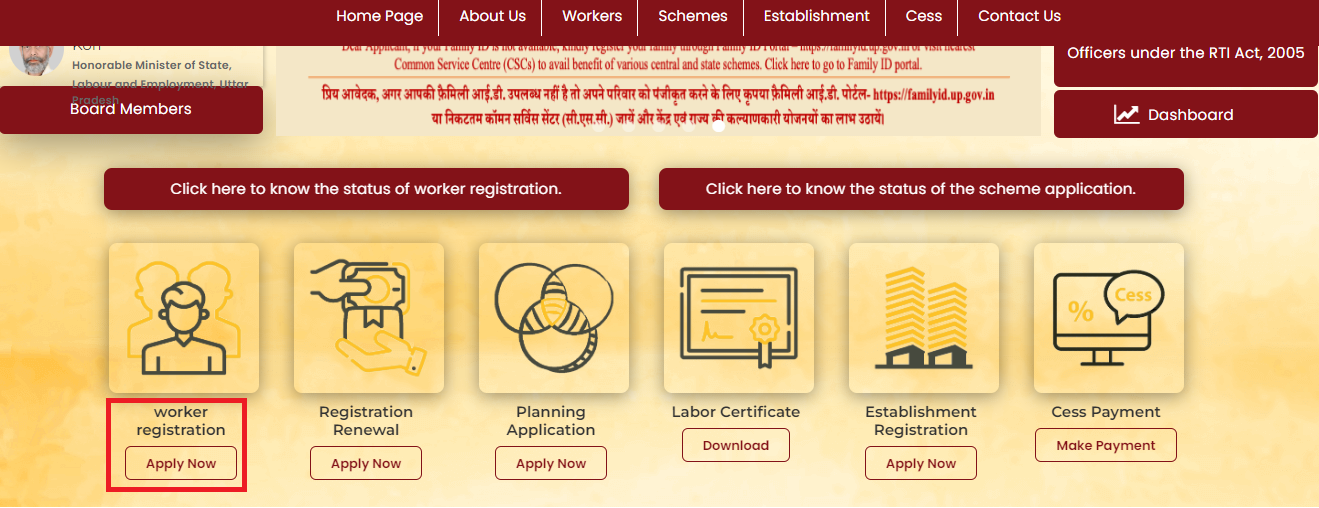
- Enter your Aadhar Card Number, Mandal, District, and Mobile Number.
- On the next page, fill in the following details: Name, Father’s/Husband’s Name, Gender, Date of Birth, and Age.
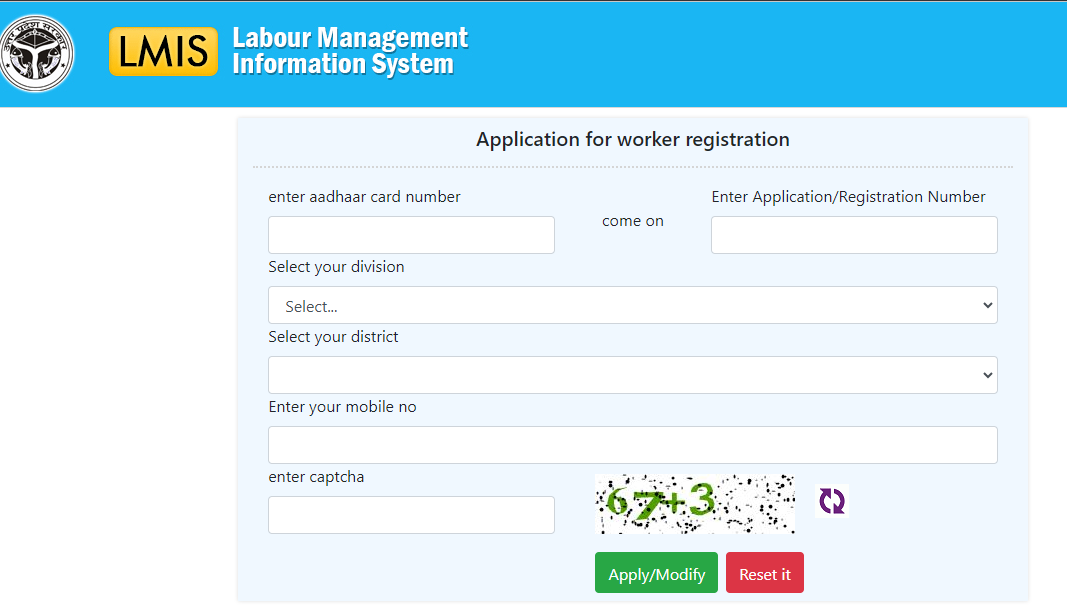
- Click on 'Aadhaar Verification.'
- Enter work type, construction days (last 12 months), address, nominee, and bank details.
- Upload required documents:
- Passport-size photo
- Self-attested Aadhaar card copy
- Self-attested bank passbook copy
- Self-declaration form
- Employment certificate
- Now enter family member details.
- Tick the declaration box, click 'Register.'
- Receive confirmation via SMS.
Required Documents
- Aadhar Card (for identity verification)
- Bank Passbook (for linking bank accounts to receive financial benefits)
- Employee Certificate (to certify that the applicant is employed in the construction industry)
- Ration Card or Voter ID (for address verification)
- Passport-size photographs (for official records)
- Mobile Number (for OTP verification and communication purposes)
Eligibility Criteria for UPBOCW Labour Card
To qualify for registration under the UPBOCW Labour Card, applicants must meet certain eligibility requirements. The eligibility criteria include:
- Age Requirement: The applicant must be between 18 and 60 years old at the time of application.
- Nature of Work: The applicant must be employed in construction work. This includes labourers engaged in construction, maintenance, repair, or demolition of buildings, roads, bridges, and other infrastructure projects.
- Minimum Employment: The labourer must have been engaged in construction work for at least 90 days in the previous 12 months before applying for registration.
Check Status
To track the status of your UPBOCW labour registration application, follow these steps:
- Visit the UPBOCW website.
- Click on the status of worker registration by scrolling below.
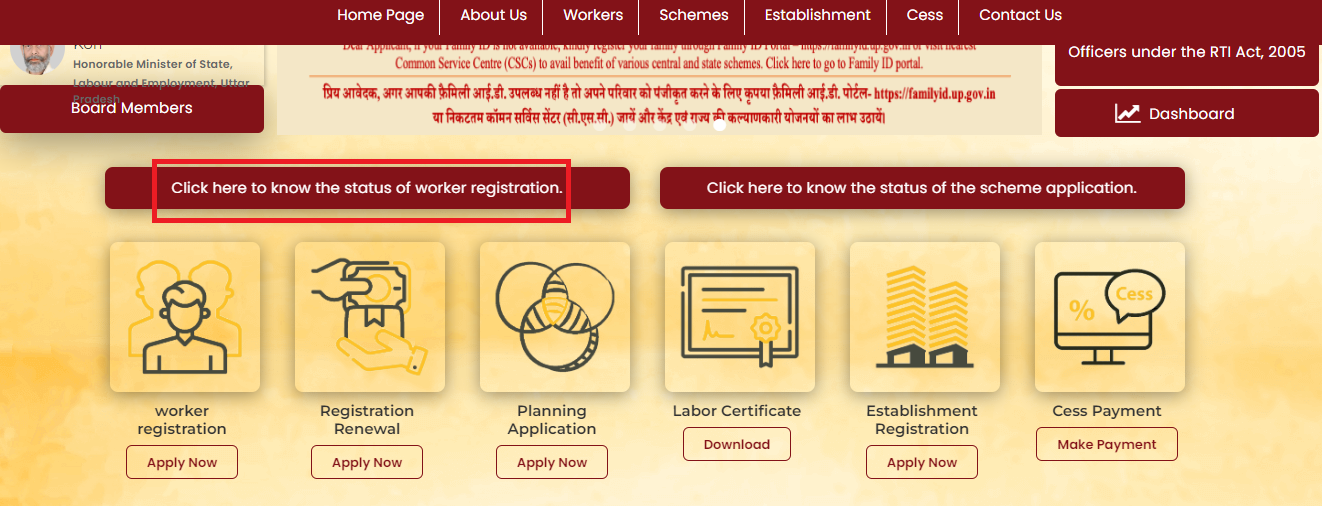
- Enter your Registration Number and Mobile Number to check the status of your application.
Renewal
The UPBOCW Labour Card is valid for a specific period, after which it needs to be renewed. The renewal process is straightforward and can be done through the official portal. Here’s how you can renew your registration:
- Go to the UPBOCW website at upbocw.in.
- Click on the “Registration Renewal” option, by scrolling below.
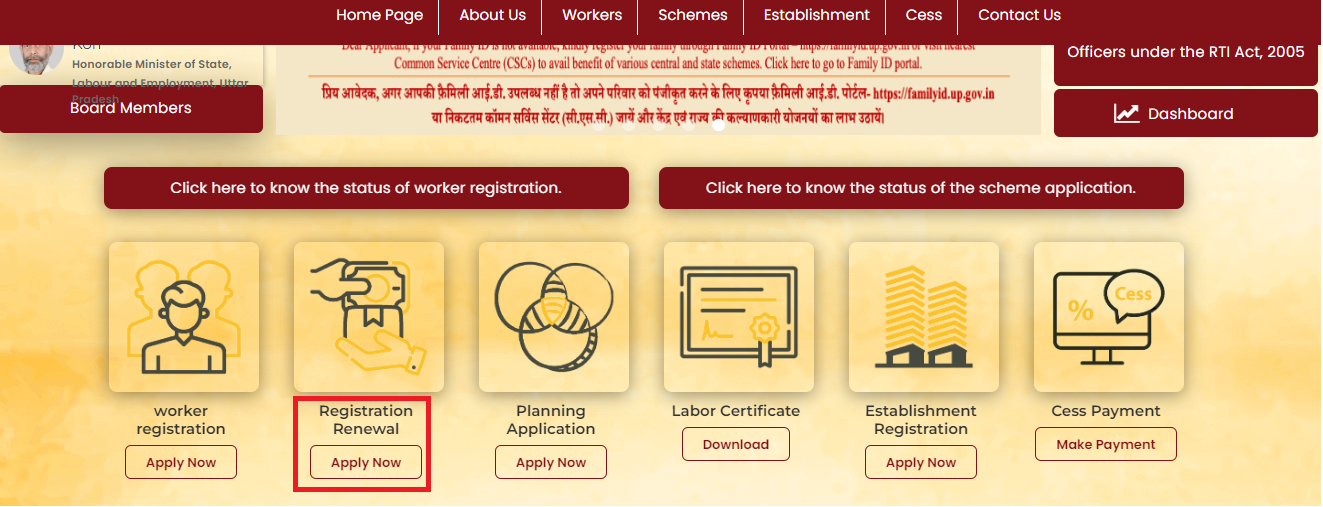
- Enter your Registration Number and click "Search."
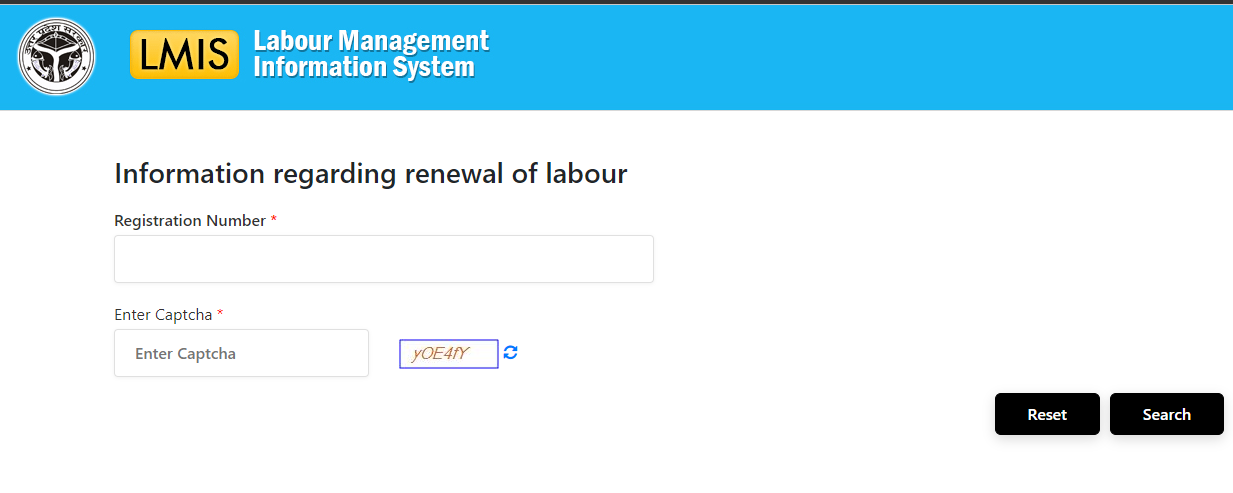
- Update any changes in your personal details, such as your mobile number or address, if required.
- Once all details are updated, submit the form to complete the renewal process.
Download Labour Certificate
Once your registration is approved, you can download your Labour Certificate from the UPBOCW portal. Here’s how to do it:
- On the homepage, click on "Labour Certificate".
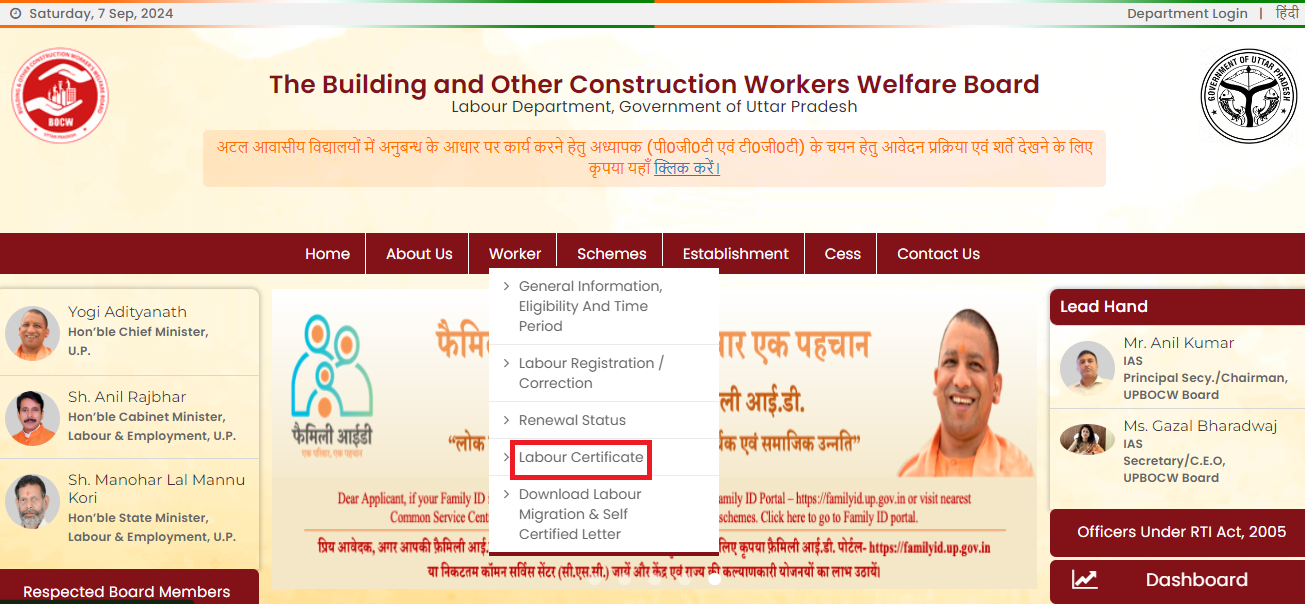
- Provide your Application Number to check the status of your certificate.
- Once your details are verified, you can download the certificate for your records.
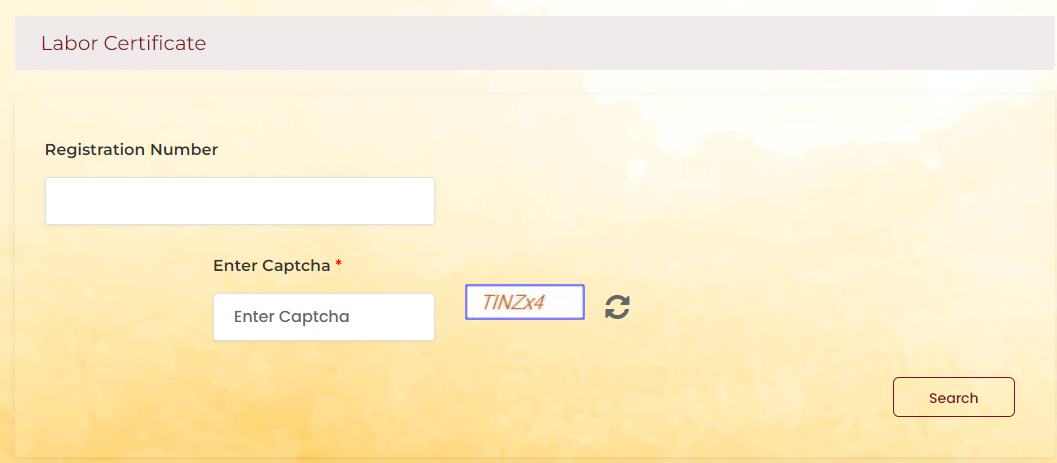
Schemes
Upon successful registration with UPBOCW, construction workers in Uttar Pradesh can access several welfare schemes. These schemes are designed to address the financial, educational, and healthcare needs of registered labourers and their families.
The available schemes are listed below:
Maternity, Child and Girl Child Help Scheme
Maternity, Child and Girl Child Help Scheme Eligibility and Benefits Overview:
- Eligibility:
- Worker must complete at least 1 year (365 days) of membership after registration.
- Maternity and Child Scheme benefits are limited to the first two childbirths.
- Maternity benefits for women are provided only for institutional deliveries.
- Girl Child Assistance Scheme is applicable for the first girl child, and for the second if also a girl. Legally adopted daughters are eligible as well.
- Required Documents:
- Updated registration.
- Certificate of institutional delivery/abortion/sterilization from a government hospital.
- Online-issued birth certificate.
- Legal adoption papers (if applicable).
- Copies of family register, Aadhaar card, and bank passbook.
- Benefits:
- Male workers: A lump sum of ₹6,000.
- Female workers: Equivalent to 3 months' minimum wages for institutional delivery + ₹1,000 as a medical bonus.
- For children:
- ₹20,000 for a son, and ₹25,000 for a daughter.
- For the first or second girl child: ₹25,000 fixed deposit.
- For a daughter born with a disability: ₹50,000 fixed deposit, maturing when she reaches 18 years unmarried.
Sant Ravidas Education Promotion Scheme
Sant Ravidas Education Promotion Scheme eligibility and benefits overview:
- Eligibility: Must be registered and active with the board for at least 1 year (365 days).
- Age limits for students as of July 1st for various classes:
- Class 1-2: 6–8 years.
- Class 3-5: 8–11 years.
- Class 6-8: 11–14 years.
- Class 9-12: 14–18 years.
- Undergraduate/Postgraduate: 18–25 years.
- MBBS/Research/Professional Courses: up to 35 years.
- Required Documents:
- Report card and admission receipt.
- Self-attested mark sheet copies for Class 1-8.
- Authenticated vouchers by principals/authorized officials for higher classes.
- Benefits:
- Financial Assistance: Class 1-5: ₹2,000, Class 6-10: ₹2,500, Class 11-12: ₹3,000.
- Cycle Subsidy for school-going children (one-time).
- Higher Education:
- Graduation and equivalent: ₹12,000 lump sum.
- Vocational and professional courses: ₹60,000 or actual fees (whichever is less).
- Post-graduate: ₹24,000 lump sum.
- Full fee reimbursement for IIM, IIT, NIT, NIFT, and National Law Universities.
- Merit Rewards:
- Class 10/12 with 70%: ₹5,000 (boys), ₹8,000 (girls).
- Graduation/Post-graduation with 60%: ₹10,000 (boys), ₹12,000 (girls).
Atal Residential School Scheme
Eligibility and benefits summary of Atal Residential School Scheme:
- Eligibility:
- Orphaned children and children of registered construction workers who have been members for at least 5 years after registration.
- A maximum of 2 children per registered worker are eligible under the scheme for school admission.
- School Guidelines:
- Curriculum will follow CBSE, in English medium, similar to Navodaya schools.
- Each school will have a capacity of 1,000 students (500 boys and 500 girls).
- An entrance exam will be conducted annually for children of construction workers and orphans, with admission based on merit.
- Facilities Provided: The schools will offer quality hostel facilities, food, sports, medical care, and security, managed by the school management committee as per the standards set by the Atal Residential School Committee.
Skill Development, Technical Upgradation and Certification Scheme
Eligibility and Benefits Summary of the scheme:
- Eligibility:
- The applicant, their spouse, or father must be a registered construction worker with up-to-date contributions.
- If the registered worker wishes to undergo training, their age must be between 18–35 years.
- There is no age limit for the worker's spouse or unmarried daughter. The maximum age for a dependent son is 21 years.
- Required Documents:
- Copy of the registration certificate.
- Proof of up-to-date contribution.
- Application form for the desired training program.
- Benefits:
- Free training will be provided through the UP Skill Development Mission.
- Registered workers who undergo training will receive compensation equivalent to the minimum wage for unskilled workers.
- Upon completion, candidates must pass an evaluation exam.
Girl marriage assistance scheme
Eligibility and benefits summary of Girl marriage assistance scheme:
- Eligibility:
- Worker must complete at least 365 days of membership after registration.
- Application for benefits must be submitted within 1 year of marriage, or 15 days before a mass marriage.
- Aadhaar authentication for the daughter and groom is mandatory.
- Benefits are limited to 2 children.
- the Daughter must be at least 18 years old, and the groom 21 years old, as per government regulations.
- Required Documents:
- Birth certificate or school-leaving certificate for both daughter and groom.
- Verified marriage card from village head/tehsildar/councilor.
- Documents for an adopted daughter (if applicable).
- Self-attested copy of family register/ration card.
- Wedding photographs (certified by the worker).
- Proof of at least 90 days of construction work in the last 12 months.
- Declaration that no benefits from similar schemes have been received.
- Benefits:
- ₹55,000 for the marriage of the worker's daughter or the registered female worker's own marriage.
- ₹61,000 for an inter-caste marriage.
- For mass marriages (minimum 11 couples): ₹65,000 per daughter and ₹7,000 per couple for event expenses, along with ₹5,000 each for clothing.
- For remarriage of a registered female worker (due to divorce or husband's death), the same benefits apply, with the necessary legal documents.
Toilet Assistance Scheme
Eligibility and benefits summary Toilet Assistance Scheme:
- Eligibility:
- Must be an up-to-date registered construction worker.
- The worker must own a house without a toilet and must not have received similar benefits from any other government scheme.
- The family will be considered as a single unit.
- The beneficiary must have an Aadhaar number and a bank account in a CBS branch of a nationalized bank.
- Required Documents:
- Proof of updated registration as a construction worker.
- Declaration that the family has not received toilet construction benefits under any other scheme and does not have a concrete house.
- Copies of Aadhaar card and bank passbook.
- Implementation of the scheme will be done through the District Panchayat Raj Officer.
- Benefits: ₹12,000 will be provided in two equal installments:
- ₹6,000 as an advance incentive.
- The remaining ₹6,000 after toilet construction is completed and in use.
- Selection of workers will be based on a baseline survey, matched with the registered workers' list.
- Payment will be directly transferred to the beneficiary's bank account by the District Panchayat Raj Officer.
Disaster Relief Assistance Scheme
Eligibility and benefits summary of Disaster Relief Assistance Scheme:
- Eligibility: Must be an up-to-date registered worker.
- Required Documents:
- This is a completely paperless scheme.
- No application form is required.
- Aadhaar number and bank account details must be available in the database.
- Benefits:
- A one-time payment of ₹1,000 will be provided to registered workers as financial assistance, which may be paid annually, semi-annually, quarterly, or monthly, as per the decision of the Central/State Government or the Board. The amount will be directly transferred to the worker’s bank account.
Mahatma Gandhi Pension Scheme
Eligibility and benefits summary of the scheme:
- Eligibility:
- Must be a permanent resident of Uttar Pradesh and an up-to-date registered worker who has completed 60 years of age.
- A minimum of 10 years of registration is required.
- The worker should not be receiving benefits from any other pension scheme run by the Central/State Government (except for ESIC and EPFO).
- Required Documents:
- Proof of up-to-date contributions until the age of 60.
- Copies of Aadhaar card, bank passbook, and residence proof.
- An affidavit stating that the worker is not receiving any pension from other government departments.
- Life certificate to be submitted annually in April. In the case of the pensioner’s death, the family must inform the District Labour Office within one month.
- Benefits:
- Eligible workers will receive a monthly pension of ₹1,000.
- Upon the worker's death, the pension will be transferred to the spouse.
- The pension amount will increase by ₹50 every two years, up to a maximum of ₹1,250.
- The board will bear the contribution for workers registered under the Pradhan Mantri Shram Yogi Maandhan Yojana.
For more details, you can Download the PDF.
Critical illness assistance scheme
Eligibility and Benefits Summary:
- Eligibility:
- Must be an up-to-date registered worker.
- Workers who are not eligible for benefits under the Pradhan Mantri Jan Arogya Yojana (PM-JAY) or Mukhyamantri Jan Arogya Yojana.
- Includes the worker, their spouse, unmarried daughters, and sons under 21 years of age.
- Required Documents:
- Proof of updated registration.
- Medical records related to the illness.
- Doctor's certificate in the prescribed format.
- Original bills for medicines purchased.
- Proof of dependency for unmarried daughters or sons under 21 years of age.
- Benefits:
- Full reimbursement equivalent to the benefits under the Ayushman Bharat scheme for treatment at government, autonomous hospitals, or empanelled hospitals.
- Advance payment can be made to the hospital based on the estimated cost of treatment/surgery.
- No maximum limit on the reimbursement amount.
For more details, you can Download the PDF.
Construction Workers Death and Disability Assistance Scheme
Eligibility and Benefits Summary:
- Eligibility:
- Workers who are registered and up-to-date are eligible for the scheme in case of disability due to accident/illness.
- In the event of the worker's death, dependents are eligible for benefits, including the spouse, adult children, or dependent parents.
- Deaths from natural disasters, murder, snake bites, lightning strikes, or childbirth are eligible, but suicide is not covered.
- Required Documents:
- Copy of online death certificate.
- Copies of the applicant’s Aadhaar card, bank passbook, and proof of dependency for children.
- FIR/Postmortem report (in case of accidental death).
- Disability certificate from the Chief Medical Officer (if applicable).
- Declaration that no similar benefits are being availed under any other government scheme.
- Benefits:
- In case of accidental death, ₹25,000 will be paid for funeral expenses, and a sum of ₹5 lakh will be paid in monthly installments of approximately ₹9,395 over 5 years.
- For natural death, ₹25,000 for funeral expenses and ₹2 lakh in monthly installments of approximately ₹8,736 over 2 years.
- In case of an accident at the workplace involving an unregistered worker, ₹1 lakh will be paid in a lump sum.
- For 100% permanent disability, ₹4 lakh will be paid in monthly installments of approximately ₹9,172 over 4 years.
- For 50% to 100% permanent disability, ₹3 lakh will be paid in monthly installments of approximately ₹8,953 over 3 years.
- For 25% to 50% permanent disability, ₹2 lakh will be paid in monthly installments of approximately ₹8,736 over 2 years.
For more details, you can Download the PDF.
Pt. Deen Dayal Upadhyay Awareness Scheme.
Eligibility and Benefits Summary:
- Eligibility: The scheme aims to raise awareness about welfare schemes, worker registration, and renewal processes for construction workers.
- Scheme Details:
- Events must focus on construction workers with the full participation of the Labour Department.
- 25% of expenses for awareness events can be advanced, and prior approval is needed for reimbursement.
- Methods include SMS, video clips, hoardings, pamphlets, street plays, and more.
- Restrictions: No names or photos of government officials or public representatives will be used in the campaigns.
For more information, you can Download the PDF.
About UPBOCW
The Building and Other Construction Workers Welfare Act, 1996 was introduced to regulate the employment, safety, and welfare of construction workers. To implement this, the Uttar Pradesh Government enacted the UPBOCW Rules in 2009.
The Uttar Pradesh Building and Other Construction Workers Welfare Board, established under Section 18(1) of the Act, oversees worker welfare in the state. Currently, 1.58 crore construction workers are registered under this board, benefiting from various health, safety, and social security measures aimed at protecting and improving their working conditions.